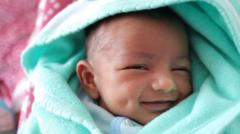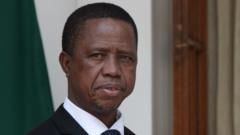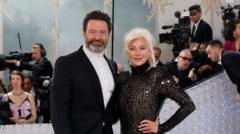With Pope Francis' support and a commitment to social justice, Cardinal David stands as a significant figure in the Philippines' Catholic landscape.
**Cardinal David's Journey from Local Bishop to Key Conclave Participant**

**Cardinal David's Journey from Local Bishop to Key Conclave Participant**
As a humble bishop representing the marginalized, Cardinal David prepares for the conclave to choose the next pope.
Cardinal Pablo Virgilio David, recently appointed by Pope Francis, is set to play a key role in the conclave tasked with electing a new pope. The bishop of Caloocan expressed his astonishment at his selection, revealing in an interview that he never anticipated being appointed as a cardinal, noting, "Not even in my wildest imagination did I think this would happen." Alongside two other Filipino cardinals, he will contribute to shaping the future of the Catholic Church.
Renowned for his work with marginalized communities, Cardinal David embodies Pope Francis' vision of a Church that is deeply connected to the people. He has dedicated his life to advocacy for the urban poor in the Philippines, a country with a vibrant but challenged Catholic populace that makes up nearly 80% of its 100 million residents. His elevation to cardinal just five months ago symbolizes a shift towards a more grassroots-focused Church.
Filipino Cardinal Luis Antonio Tagle is also seen as a strong candidate in the upcoming papal election, reflecting the Philippines' unique position in the global Catholic church. However, the Church faces hurdles as its doctrines on family planning and divorce face increasing scrutiny. The arrival of newer charismatic churches is also reshaping the religious landscape.
Cardinal David is well-known for his outspoken criticism of former President Rodrigo Duterte's controversial war on drugs, which resulted in a staggering number of casualties. During this tumultuous period, he sought to support victims of police violence and publicly denounced the drug policy as immoral. His efforts earned him both respect and backlash, including death threats and accusations from Duterte.
The cardinal's commitment to social justice and standing against violence has been influential in revitalizing the Church's moral standing among clergy and laypeople alike. Reflecting on the challenges posed by the drug war, he stated, "When I would ask people what they thought, you know, why these people were targeted... I said, so what? So what?" His defense of those affected by police brutality demonstrates his unwavering dedication to social equity.
Historically, the Catholic Church in the Philippines has seen shifts in its political role, often oscillating between collaboration and opposition to the state. The late Pope John Paul II and Pope Francis have both sought to rejuvenate the Church's relevance, though Cardinal David acknowledges the need for humility and adaptation in the face of criticism.
Amidst a backdrop of declining weekly service attendance and growing scandals, including sexual abuse allegations, Cardinal David remains hopeful. He believes that addressing these issues with candor and vulnerability, as advised by Pope Francis, is essential for restoring the Church's credibility and connecting with a disengaged congregation. As he prepares to vote in the conclave, Cardinal David embodies a hopeful vision for a Church that serves as a moral compass in the evolving landscape of Philippine society.
Renowned for his work with marginalized communities, Cardinal David embodies Pope Francis' vision of a Church that is deeply connected to the people. He has dedicated his life to advocacy for the urban poor in the Philippines, a country with a vibrant but challenged Catholic populace that makes up nearly 80% of its 100 million residents. His elevation to cardinal just five months ago symbolizes a shift towards a more grassroots-focused Church.
Filipino Cardinal Luis Antonio Tagle is also seen as a strong candidate in the upcoming papal election, reflecting the Philippines' unique position in the global Catholic church. However, the Church faces hurdles as its doctrines on family planning and divorce face increasing scrutiny. The arrival of newer charismatic churches is also reshaping the religious landscape.
Cardinal David is well-known for his outspoken criticism of former President Rodrigo Duterte's controversial war on drugs, which resulted in a staggering number of casualties. During this tumultuous period, he sought to support victims of police violence and publicly denounced the drug policy as immoral. His efforts earned him both respect and backlash, including death threats and accusations from Duterte.
The cardinal's commitment to social justice and standing against violence has been influential in revitalizing the Church's moral standing among clergy and laypeople alike. Reflecting on the challenges posed by the drug war, he stated, "When I would ask people what they thought, you know, why these people were targeted... I said, so what? So what?" His defense of those affected by police brutality demonstrates his unwavering dedication to social equity.
Historically, the Catholic Church in the Philippines has seen shifts in its political role, often oscillating between collaboration and opposition to the state. The late Pope John Paul II and Pope Francis have both sought to rejuvenate the Church's relevance, though Cardinal David acknowledges the need for humility and adaptation in the face of criticism.
Amidst a backdrop of declining weekly service attendance and growing scandals, including sexual abuse allegations, Cardinal David remains hopeful. He believes that addressing these issues with candor and vulnerability, as advised by Pope Francis, is essential for restoring the Church's credibility and connecting with a disengaged congregation. As he prepares to vote in the conclave, Cardinal David embodies a hopeful vision for a Church that serves as a moral compass in the evolving landscape of Philippine society.























